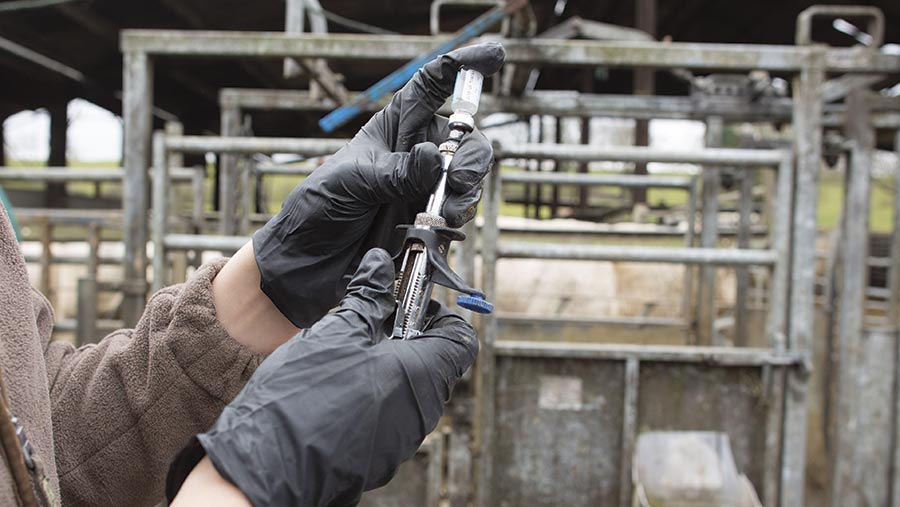Livestock farmer forced to destock herd to rid farm of TB
 © Tim Scrivener
© Tim Scrivener A livestock farmer has been forced to take drastic action and destock his herd in Sussex in a bid to rid the farm of TB.
A rare and extended TB breakdown, which farmer David Butler estimates has cost him £200,000, lasted three years at Tremain Farm, Horsted Keynes, Sussex.
As a result, he saw no other option than to destock, steam clean and rest the farm for six months to clear the farm and environment of the disease.
See also: TB accreditation scheme launches
TB challenges
The challenges with TB began in May 2013, following Mr Butler’s decision to sell the 300-cow dairy herd at Tremain Farm.
The plan was then to continue to rear replacement heifers at the unit for the family’s 600 cow dairy in Dorset. However, pre-movement testing picked up the first ever TB reactor on the unit, placing the farm in lockdown.
What added to the challenge was the farm’s location in the south east – where TB is a rarity.
The fact the farm has land in West Sussex, which is classified as a low risk area (LRA), while land in the north of East Sussex is an edge area.
This meant cattle had to be pre-movement tested when moving from east to west.
Having made no forage and with the bank unwilling to increase debt, Mr Butler struggled through the winter following the breakdown thanks to help from neighbours and family.
Subsequent testing continued to identify the occasional inconclusive reactor (IR) and in the autumn of 2014, APHA embarked on an eradication programme.
TB strains
As movement of cattle from Dorset may have been a risk, tests were carried out to look at the strain of TB.
Mr Butler explains: “There was one animal with the Dorset strain that reacted, but the others were another strain so the source of TB has never been that clear.”
Gamma interferon testing identified a level of TB in all groups with about 80 animals culled. Further testing continued to pick up reactors and IRs, with about 150 head slaughtered between 2013 and 2016. By July this year, Mr Butler decided things couldn’t go on.
“We needed 1.8m litres of production to keep the business afloat and it was rapidly heading to a business of 600,000 litres.
“With the reduction of milk and the complete collapse of milk price, we couldn’t farm our way out of the problem,” says Mr Butler, who estimates the loss of marginal litres cost the business about £200,000.
As a result, 36 barren cows were culled and 70 in-calf animals sent to the Dorset herd. About 47 bulling heifers remain on farm and will eventually be sold, in-calf.
Clean-up operation
Mr Butler then embarked on a clean-up operation to get rid of TB in the environment. The slurry lagoon was emptied and washed out three times and spread on land.
Following Animal and Plant Health Agency recommendations, this land is now not being grazed or silaged for six months to allow TB bacteria to break down.
The unit was also cleared, steam cleaned and disinfected by contractors at a cost of £20,000-£25,000, including slurry removal.
The focus has been on managing the environment on the main unit as all reactors were found in the milking herd. The youngstock – which are run on land two or three miles from the dairy – have generally been identified as low risk. In fact, since the main herd has left, the farm is now TB free.
Mr Butler adds: “The plan was to stop milking cows in Sussex anyway, so we’ve achieved what we wanted to do in 2013 by 2016. But in three years it’s costs us £200,000 to get the business clear of TB.”
Mr Butler is also as yet unconvinced environmental controls will have reduced TB risk enough to warrant continuing with his plan to rear replacements on the unit.
His main concern is about the potential reservoir of disease in wildlife and camelids and he believes this could be the reason for “pockets” of TB springing up in LRAs.
“All farmed animals, whether alpacas, whatever, should be TB tested and there should be increased wildlife monitoring and observations. If wildlife is seen to have TB problems around a clean area, they should be culled immediately – we have to stop the spread.”
To get round the issue, Mr Butler was keen to set up an approved finishing unit, but this has been disallowed due to his location in a LRA. To keep going, he is selling land and diversifying into non-farming activities.
